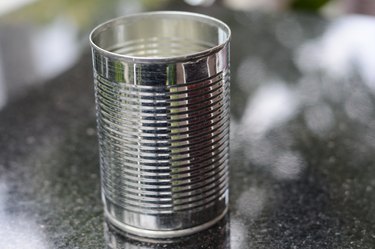
While fresh milk is nutritious, it isn't always convenient if you're interested in long-term storage. Milk generally has a short shelf life, but canned milk will keep for much longer periods of time. Some recipes, particularly for baked goods, call for canned milk specifically. This food is relatively healthy, containing various vitamins and minerals, although it can be high in fat and calories, depending on the type you use.
Calories and Fat
Video of the Day
A 1-cup serving of canned milk provides 340 calories. Because canned milk is condensed or evaporated, this is far more than the 146 calories per cup in regular whole milk. The fat content is concentrated as well, with 19 g of fat per cup in canned milk, compared with 8.3 g of fat in fresh milk. Most of the fat in canned milk derives from saturated fat, an unhealthy variety of fat that may result in clogged arteries if you consume too much. The suggested daily limit of this type of fat stands at 15 g per day; a 1-cup serving of canned milk contains 11.5 g.
Video of the Day
Protein and Carbohydrates
Canned milk contains 17.1 g of protein per serving, or 30.5 to 37.1 percent of the quantity of protein you should consume every day. Some people experience allergic reactions to the proteins in milk; this is different from lactose intolerance, a reaction to a type of sugar in milk. If you have milk allergies, do not consume canned milk. One serving of this type of milk has 25.3 g of carbohydrates. Women need about 225 g carbs each day; men need about 325 g.
Minerals
If you drink 1 cup of canned milk, you take in 658 mg of calcium, which satisfies more than half of the daily 1,000 mg requirement for adults ages 19 to 50. You need slightly more – 1,200 mg – if you're older than that, and young pregnant women require 1,300 mg per day. Calcium promotes bone strength, although you need vitamins D and K in your diet as well, to help your body properly use the mineral. Canned milk also provides some iron, magnesium, phosphorus, potassium, zinc and selenium.
Vitamins
Vitamins D and K are present in canned milk, but only in small amounts. You'll get quite a bit of vitamin A, however. With 602 IU of this vitamin per serving, it meets nearly your entire daily requirement if you're a woman, and about two-third of your daily requirement if you're a man. A serving of canned milk also provides vitamin C, a variety of B vitamins and vitamin E.
- McKinley Health Center; Macronutrients: the Importance of Carbohydrate, Protein, and Fat; Mar. 26, 2008
- USDA National Nutrient Database: Milk, Canned, Evaporated, Without Added Vitamin A and Vitamin D
- Calorie Gallery: Whole Milk
- MayoClinic.com; Milk Allergy; Aug. 12, 2009
- University of Maryland Medical Center; Calcium; Mar. 20, 2009
- MedlinePlus; Vitamin K; Mar. 7, 2009
- MedlinePlus; Vitamin A; Linda Vorvick, MD; March 2009